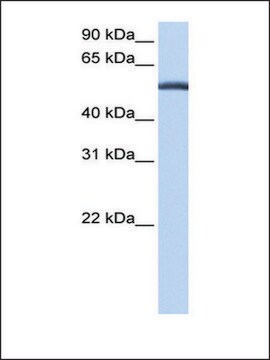CMC0014
BL21(DE3) Chemically Competent Cells
Escherichia coli, rod shaped
Synonym(s):
Competent E. coli cells
About This Item
Recommended Products
product name
BL21(DE3) Chemically Competent Cells, for protein expression
biological source
Escherichia coli
grade
for molecular biology
growth mode
adherent or suspension
morphology
rod shaped
technique(s)
microbiological culture: suitable
cell transformation
competent cell type: chemically competent
transformation efficiency: ≥1 x 107 cfu/μg
shipped in
dry ice
storage temp.
−70°C
General description
Genotype
F – ompT hsdSB (rB- mB-) gal dcm (DE3)
Application
- to express tau 2N4R isoform (aa1–441) and the truncated tau (aa1–421) using pET19b as expression vector.
- BL21(DE3)Chemically Competent Cells has been used for the transformation and expressionof protegrin-1 (PG1) peptides.
- to express 6His-TEVsite-Hs ARF1 (17-181)-Q71L in pHis2 vector.
Features and Benefits
- a transformation efficiency of >1 × 107 cfu/μg.
- economical prices
- offering superior value for everyday protein expression work.
Components
- BL21(DE3) chemically competent cells
- pUC 19 transformation control DNA
- recovery medium for expression
related product
Storage Class Code
10 - Combustible liquids
Certificates of Analysis (COA)
Search for Certificates of Analysis (COA) by entering the products Lot/Batch Number. Lot and Batch Numbers can be found on a product’s label following the words ‘Lot’ or ‘Batch’.
Already Own This Product?
Find documentation for the products that you have recently purchased in the Document Library.
Customers Also Viewed
Related Content
BL21 Chemically Competent Cells come in aliquots for easy transformation with heat shock method, facilitating molecular biology experiments.
BL21 Chemically Competent Cells come in aliquots for easy transformation with heat shock method, facilitating molecular biology experiments.
BL21 Chemically Competent Cells come in aliquots for easy transformation with heat shock method, facilitating molecular biology experiments.
BL21 Chemically Competent Cells come in aliquots for easy transformation with heat shock method, facilitating molecular biology experiments.
Our team of scientists has experience in all areas of research including Life Science, Material Science, Chemical Synthesis, Chromatography, Analytical and many others.
Contact Technical Service






